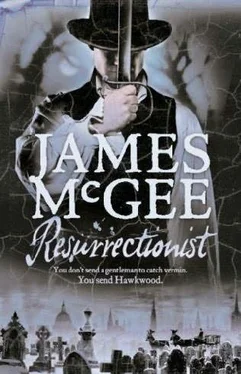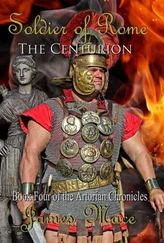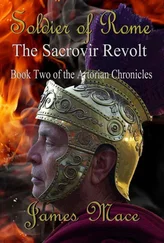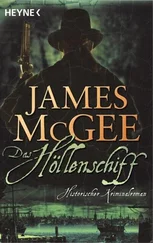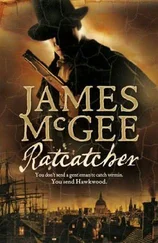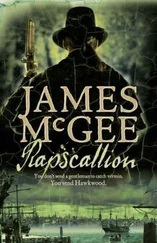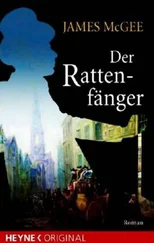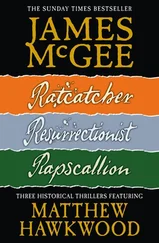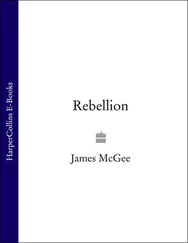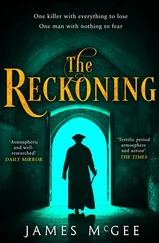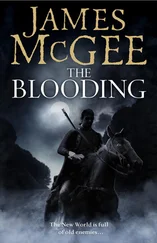James McGee - Resurrectionist
Здесь есть возможность читать онлайн «James McGee - Resurrectionist» — ознакомительный отрывок электронной книги совершенно бесплатно, а после прочтения отрывка купить полную версию. В некоторых случаях можно слушать аудио, скачать через торрент в формате fb2 и присутствует краткое содержание. Жанр: Исторический детектив, на английском языке. Описание произведения, (предисловие) а так же отзывы посетителей доступны на портале библиотеки ЛибКат.
- Название:Resurrectionist
- Автор:
- Жанр:
- Год:неизвестен
- ISBN:нет данных
- Рейтинг книги:4 / 5. Голосов: 1
-
Избранное:Добавить в избранное
- Отзывы:
-
Ваша оценка:
- 80
- 1
- 2
- 3
- 4
- 5
Resurrectionist: краткое содержание, описание и аннотация
Предлагаем к чтению аннотацию, описание, краткое содержание или предисловие (зависит от того, что написал сам автор книги «Resurrectionist»). Если вы не нашли необходимую информацию о книге — напишите в комментариях, мы постараемся отыскать её.
Resurrectionist — читать онлайн ознакомительный отрывок
Ниже представлен текст книги, разбитый по страницам. Система сохранения места последней прочитанной страницы, позволяет с удобством читать онлайн бесплатно книгу «Resurrectionist», без необходимости каждый раз заново искать на чём Вы остановились. Поставьте закладку, и сможете в любой момент перейти на страницу, на которой закончили чтение.
Интервал:
Закладка:
“The sight of blood disturbs you, Officer Hawkwood?” The surgeon inclined his head.
“Only if it’s mine,” Hawkwood said.
Carslow considered Hawkwood’s response and allowed himself a taut smile. Close to, Hawkwood was struck by the ruddy hue in the surgeon’s cheeks; it was a complexion that would not have been out of place on a gentleman farmer. He wondered about the surgeon’s origins. In the lecture theatre, Carslow’s voice, while not strident, had reached every corner of the room, and his delivery had been clear and concise. But despite the well-modulated tones, there was a detectable burr that hinted at an upbringing some distance from the capital. The occasional rolling consonants suggested somewhere to the east, Suffolk or Norfolk, perhaps.
“Now, sir, I do believe we were on the point of discussing the reason for your visit?” Carslow made a display of shooting his cuffs and moved to a small wall mirror, where he proceeded to adjust his collar and stock.
“Colonel Titus Hyde…” Hawkwood began. “I’d like to know why his Admission Bond at Bedlam Hospital carries your signature.”
The hesitation was so slight that, if it hadn’t been for the tightening of the material across the shoulders of the surgeon’s coat, Hawkwood might well have missed it.
Carslow turned, his fingers playing with the knot of his cravat. “I wondered whether someone might come.”
Hawkwood waited.
“The answer is simple. I signed my name to the bond because I felt it was my duty to do so.”
The surgeon paused, considering his words.
“Titus Hyde and I were students together. We were from different backgrounds, but similar in age. We attended the same lectures. We had the same teachers. Our mentor was John Hunter. You’ve heard of Hunter, of course?”
Only from the book spines in the colonel’s rooms, Hawkwood thought. He shook his head.
Carslow looked surprised. “Really? He was a great surgeon. A pioneer. He taught us so much: anatomy, respiration, the circulation of the blood… Hunter changed the way students were taught. Our lessons weren’t just about medicine. They included chemistry, natural history, physiology, the function of living things; even philosophy. Hunter wanted to sweep away all the old superstitions. He wanted students to question, to think for themselves. He once said that hospitals were not just places where surgeons gained experience before trying their luck on the wealthy, but centres for educating the surgeons of the future. Titus and I worked as his dressers during several of his operations. We were like explorers, charting the oceans, discovering new worlds…”
Apothecary Locke had said much the same thing, Hawkwood remembered. It could have been an echo.
Carslow smiled. “He would tell us not to make notes during our lessons because he was a student himself and his views were constantly changing. I recall someone — it may even have been Titus — challenging him on that, and Hunter said that by altering his views he hoped to grow wiser every year. I know there were some who judged his style too informal, and it was true that he had a tendency to meander, but Titus and I found his methods wonderfully liberating.
“He used to call the body ‘the machine’. He was the finest surgeon of his age, and yet he had a profound respect for the healing powers of nature. He was the one teacher who told us that surgery should only ever be considered as a last resort.” Carslow paused. “He was an inspiration; an exceptional man.”
The surgeon fell silent. The colour in his cheeks deepened. He looked vaguely embarrassed. “Forgive me, Officer Hawkwood; it would appear that I’ve inherited my mentor’s gift for obliquity. You are here, after all, to ask me about Titus Hyde.”
Obliquity? Hawkwood thought.
The surgeon collected himself. “After our studies in London were complete, we went our separate ways. I spent time in Paris. Titus travelled to Italy. Their anatomy schools enjoy a particularly fine reputation. When I returned, I entered private practice. Titus embarked on his military career. His father was in the army; his grandfather too. He saw it as carrying on the family tradition. He was fortunate in having the patronage of John Hunter to assist in his deployment. Mr Hunter had recently been appointed Surgeon-General. It was through Hunter’s help and family connections that Titus was able to purchase his commission.”
Hawkwood had wondered about Hyde’s rank. Army surgeons commonly held the rank of captain. Few, if any, held the rank of colonel. There was an old saying about rank having its privileges. In the army it was often the other way round.
“What was his regiment?”
“The 6th Regiment of Foot.” Carslow’s face softened. “It’s a sad fact, Officer Hawkwood, that the battlefield provides great opportunities for the surgeon. It offers him the chance to investigate all manner of injury. I think it was Larrey who said that war carries surgery to the highest pitch of perfection. He’s Bonaparte’s chief surgeon, so I’m more than content to take his word for it. Ironically, the vast number of casualties returning from Spain has allowed civilian surgeons like myself the chance to hone our particular skills.”
Hawkwood thought back. From what he could remember of Hyde’s regiment, they’d been in the thick of it from the beginning. The 6th had probably seen as much action as the Rifles. As a regimental surgeon, Hyde would have had his work cut out, that much was certain.
“Titus and I continued to exchange letters, though our correspondence became more infrequent as time went by. A few months would pass, sometimes a year, and then a letter would arrive telling me of his travels in some distant land. I would write back about my life in London, and then another year or two would elapse. Then, just when I thought I would never hear from him again, a letter would turn up out of the blue. And so it went on.”
The surgeon hesitated. There were two chairs in the room. Carslow took one and indicated that Hawkwood should take the other. “It was in his letters from the Peninsula that I first began to notice the change. It had been a while since I’d received any correspondence from him, though he did send a brief note from Ireland — I remember he was not taken with the weather there. It rained so much, he thought he would rust. The next letter was from Spain. There’d been a battle, Rol
… I forget the precise name. I — ”
“Rolica,” Hawkwood said.
“Yes, that was it.” There was a questioning look in the surgeon’s eyes.
“I was there,” Hawkwood said, and wondered immediately why he’d felt the need to admit it.
The 95th had played a crucial role in the battle and the lead-up to it. Hawkwood had led raiding parties against the enemy’s rearguard, employing hit-and-run tactics that had infuriated the French general, Delaborde. The weather had been blisteringly hot, Hawkwood remembered. Hyde would have found it vastly different from rain-sodden Ireland.
Carslow stared at him. A shadow fell across the doorway. It was one of the dressers. “Time for rounds, Mr Carslow.”
Carslow turned. “Thank you, Mr Flynn, you may tell Mr Gibson to begin. I’ll join him presently.”
The dresser frowned, threw Hawkwood a curious glance, then left.
Carslow leaned forward. “So you were there?”
“I was a soldier,” said Hawkwood.
For a moment it looked as though the surgeon was waiting for Hawkwood to expand on his statement, but the dark shadow in Hawkwood’s eyes must have told Carslow that was not going to happen.
“Titus wrote that there were many wounded,” Carslow said.
Hawkwood nodded.
“His letter said that conditions in the aid posts were very bad.”
Читать дальшеИнтервал:
Закладка:
Похожие книги на «Resurrectionist»
Представляем Вашему вниманию похожие книги на «Resurrectionist» списком для выбора. Мы отобрали схожую по названию и смыслу литературу в надежде предоставить читателям больше вариантов отыскать новые, интересные, ещё непрочитанные произведения.
Обсуждение, отзывы о книге «Resurrectionist» и просто собственные мнения читателей. Оставьте ваши комментарии, напишите, что Вы думаете о произведении, его смысле или главных героях. Укажите что конкретно понравилось, а что нет, и почему Вы так считаете.
